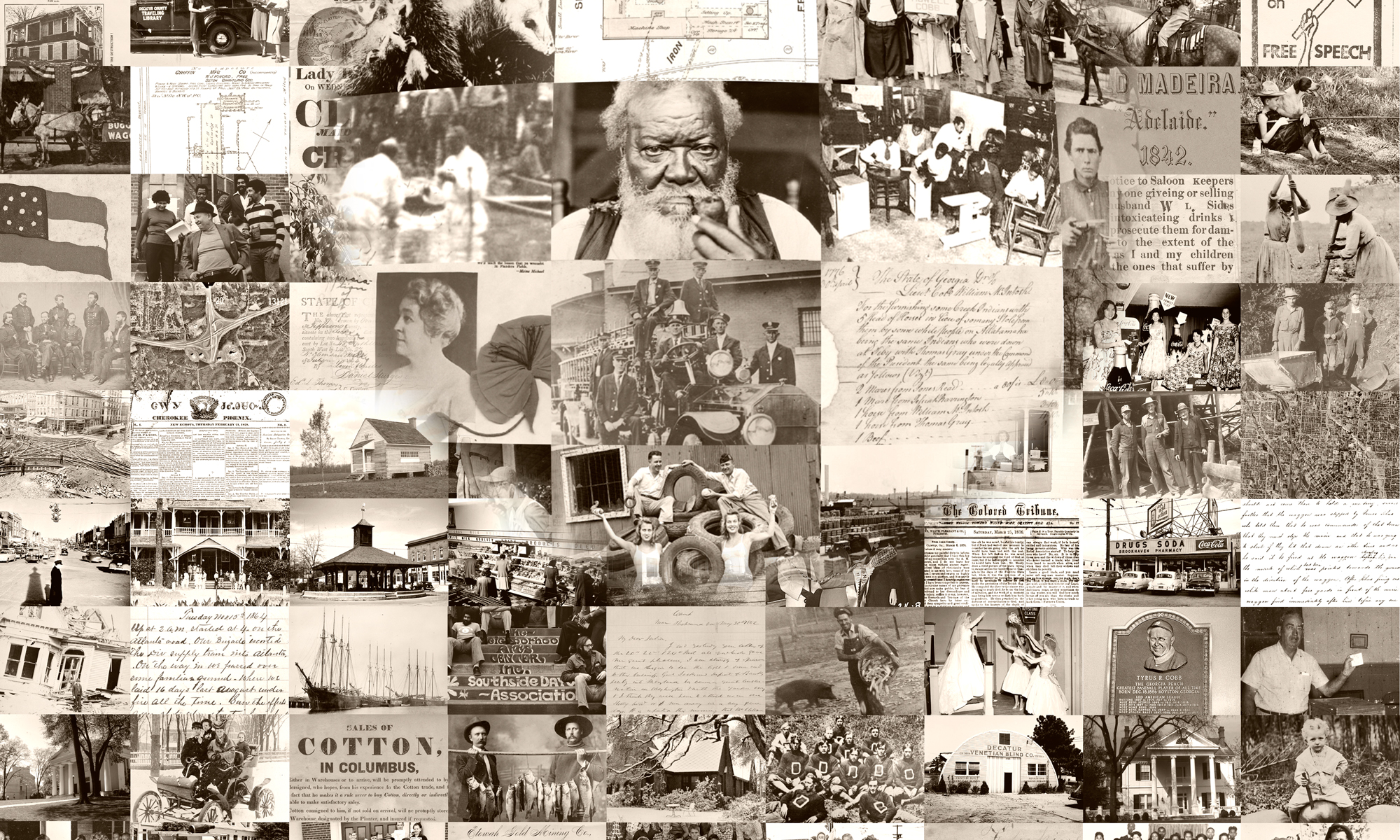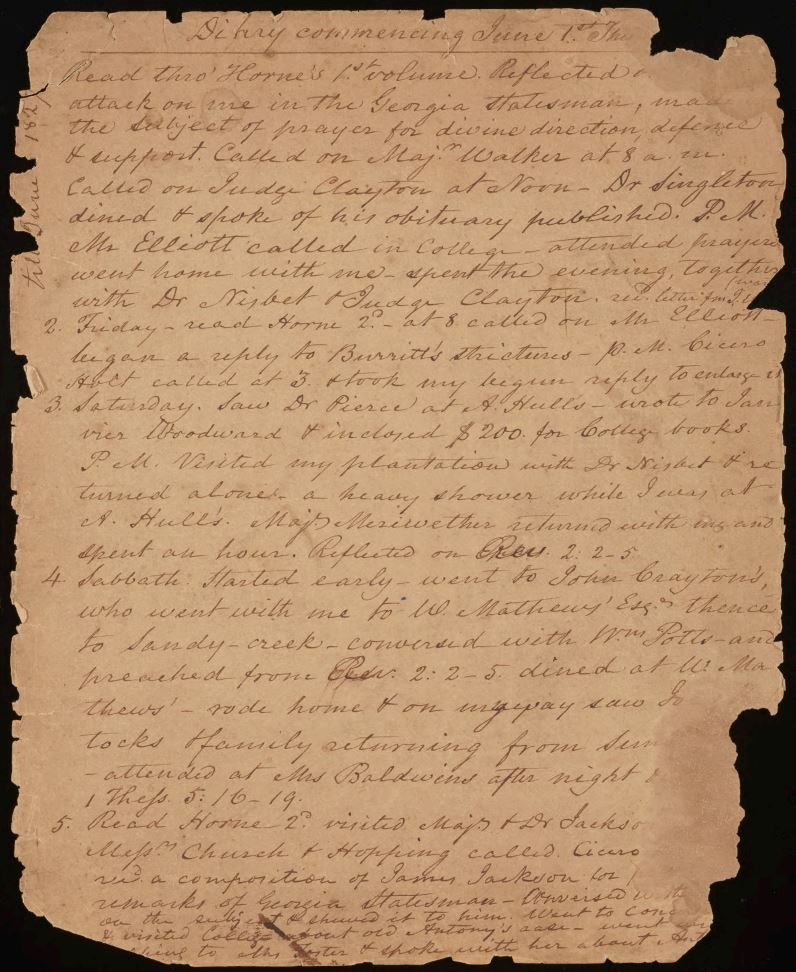The Digital Library of Georgia has just released a collection of archival documents belonging to Saint Paul’s Church, the oldest church and institution in the city of Augusta and one of the oldest in Georgia.
The collection, the St. Paul’s Church of Augusta Collection, is available at https://dlg.usg.edu/collection/spcag_spcagc.
Susan Yarborough, chair of the St. Paul’s Church history committee, outlines the church’s presence in Augusta:
“Founded in 1750, St. Paul’s has a triple life as an active congregation, as a physical space encompassing buildings and a graveyard, and as a historic parish of the Episcopal Church. The oldest identified grave in its graveyard dates to 1783. Past parishioners of Saint Paul’s church include a signer of the U. S. Constitution, five governors of Georgia, six Confederate generals, the namesakes of several Georgia counties, two founding faculty of the Medical College of Georgia, several Augusta mayors, and an owner and an editor of The Augusta Chronicle newspaper.”
Significant among the church’s materials are:
- the church’s Vestry minutes for the years 1855-1923 encompass the 73-year period including the Civil War and Reconstruction, World War I, and the church’s destruction by fire in March 1916. The minutes record names of ministers and Vestry members, costs for the building and upkeep of the church and its furnishings, salaries of ministers, organists and sextons, pew rents, donations to charitable institutions, insurance policies, arrangements for special church services, eulogies to people important to the parish, and the efforts to rebuild the church after the fire.
- With alphabetical indexes, three parish registers spanning the years 1820-1937, including records of marriages, baptisms, confirmations, communications, and burials, with a churchyard map, texts of grave markers, and statistics concerning the rites performed. The parish register from 1820-1868 records marriages, baptisms, confirmations, and burials for roughly 220 enslaved persons, beginning in 1823 and ending in 1865. The enslaved persons denoted in these records were largely house servants, often mixed race, who lived on close terms with their owners. In some cases, the actual houses in which these enslaved persons served their owners still exist, and the addresses are listed in extant city directories of the time.
Yarborough adds: “The marriage records of these enslaved persons indicate names of the groom, bride, slave owners, minister, and date and location of the ceremony. These enslaved persons’ baptismal records indicate names of infant, mother, father (occasional), slave owner, minister, and baptismal sponsors (mother, slave owner or proxy, or other enslaved persons). Of particular note are multiple births recorded to enslaved mothers.”
Yarborough concludes that “Information from such entries combined with Richmond County and surrounding counties’ slave inventories, appraisement, and sale records 1785-1865, probate records, and newspaper accounts of slave sales and freedom seekers can assist in tracing pre-Emancipation lines of kinship.”
There are many more materials, including marriage registers, historical extracts, print histories, articles, clippings, booklets, calling cards, and correspondence that account for the church’s early history, church conventions, centennial celebrations, and burials.
Erick D. Montgomery, the executive director of Historic Augusta, Incorporated, who has regularly touched upon these materials in his work, notes:
“Having these historical materials available through digitization online will make valuable records available to anyone interested in the history of Georgia, Augusta, religion, societal trends, enslaved and free African Americans, genealogical connections, and countless other topics unforeseen.”
Featured images:
A page spread showing the grave marker of Commodore Oliver Bowen (ca. 1740–1800), a naval commander in the American Revolution, buried in Saint Paul’s Church’s graveyard. The image appears between pages 4 and 5 of The Story of St. Paul’s Church, Augusta – Georgia, A.D. 1750-1906, by the Rev. Chauncey Camp Williams, who was Rector of Saint Paul’s from 1877-1906. https://dlg.usg.edu/record/spcag_spcagc_spc10
Page 122 from the Parish Register of Saint Paul’s Church for 1864, showing the baptismal records for Rose “(colored),” a daughter born to Cyrus and Mary, both persons enslaved by Mrs. Elizabeth Bowen, who is serving as baptismal sponsor. Two rows below is the baptismal record for Elisa Jane Beard “(colored),” daughter of Thomas P. and Carolina Beard, who were free persons of color. In 1868, Thomas P. Beard would become the first African American from Augusta, Georgia, to be elected to the Georgia House of Representatives. https://dlg.usg.edu/record/spcag_spcagc_spc14
About Saint Paul’s Church
Saint Paul’s Church is a community of people committed to serving and worshiping Jesus Christ in their current location for over 250 years. With their roots deeply embedded in the city of Augusta and the surrounding area, they “seek and serve Christ in all persons.” They are also rooted in their Anglican (Church of England) heritage and are an integral part of the Episcopal Diocese of Georgia. Visit their web site at www.saintpauls.org/.


